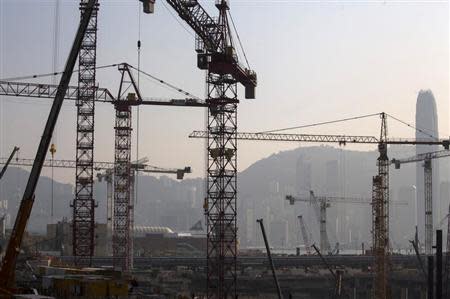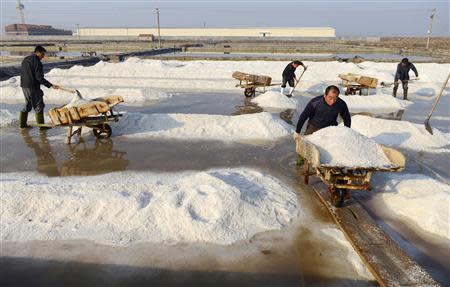Granted 'decisive' role, Chinese markets decide to slide
By Pete Sweeney and Clement Tan SHANGHAI/HONG KONG (Reuters) - China's leaders failed to impress markets with their reform agenda for the next decade and investors sold Chinese shares on Wednesday concerned with Beijing's apparent reluctance to overhaul dominant state-owned firms. The communique following a secret leadership meeting listed several target areas for reform, but its language was more vague than some had expected and it explicitly underscored the importance of the state sector in the economy. But rather than lift state firms that dominate major benchmark indexes in China and Hong Kong, it spurred worries that it would leave them exposed once the authorities made good on their pledge to give markets a "decisive" role in the economy. "The increased reliance on market mechanisms is good for the economy, but bad for the equity markets. While that will force companies to be run more efficiently, more competition will hit their bottom line," said Erwin Sanft, Standard Chartered's head of Hong Kong and China equity research, who recommends underweight positions in banking, telecoms and power, key sectors dominated by state firms. The highly anticipated gathering of the Communist Party's top brass for a four-day conclave promised "decisive results" by 2020, an unusually explicit self-imposed deadline. To drive the process, they set up a top-level special working group, suggesting a more vigorous reform push by President Xi Jinping and Premier Li Keqiang than one seen under the previous administration. The duo, who formally took power in March, must unleash new sources of economic activity as growth slides towards its weakest annual pace in over two decades. "Frankly, there are a lot of questions still to be answered," U.S. Treasury Secretary Jack Lew said on CNBC during a visit to Singapore. "The communique coming out of the plenum was at a very general level." Xi said on Wednesday that reforms cannot be achieved in one stroke, while the cabinet underlined the need to make good on reform commitments "to boost people's confidence." Some details may be filled in next week, when a much longer version of the leaders' deliberations is expected. SELLERS TARGET BANKS Chinese stocks of companies in surveillance and defense outperformed sharp falls elsewhere after Beijing flagged a security revamp in its reforms. The CSI300 of leading Shanghai and Shenzhen A-shares, in which foreigners can only invest through a quota system, tumbled 1.7 percent for its biggest daily loss in four months. The China Enterprises Index in Hong Kong of top Chinese listings - dominated by state firms - fell 2.7 percent for its biggest loss in three months. The yuan edged lower. The Chinese banking sector bore the brunt of the selloff, with insurers, power producers and energy giants also among the big losers. Banks were partly hit by bad loans data. In Hong Kong, Industrial and Commercial Bank of China (ICBC), the world's top bank by market value, suffered its heaviest single-day loss in more than four months, falling 3.5 percent. Share dealers said macro hedge funds, which bet on the direction of an economy, were major sellers having built positions last week in expectation the leaders' meeting may rally the market. Some media reports had raised expectations that meeting, the Communist Party Central Committee's plenary session, would announce a blueprint to reform state-owned enterprises that exert vast influence given their dominant role in the economy. But on reflection, World Bank Country Director Klaus Rohland said that the government might be adopting the right approach. "The more I think about SOE reform, the more I realize the most promising way to address this over time is to increase competition," he told Reuters. "What I think you could do is build a firewall between politics and SOEs and subject the SOEs to more market discipline." RISKS Still, an editorial on Wednesday in the Global Times, an influential tabloid published by the official People's Daily, warned of the risk entrenched interests continue to pose to market-based reform. "With the advancing of reform, we should firmly oppose vested interest groups," the editorial read. "If we don't seek a consolidation of group interests and whole social interests, reform will be an empty slogan." Some economists believe that reforming markets without reforming market players risks further economic distortions. "As long as the government does not allow large SOEs to fail, they will be more creditworthy than private sector rivals," Mark Williams and Qinwei Wang, of Capital Economics, said in a research note, adding that an implicit state guarantee would allow state firms to take greater advantage of financial liberalization. Some economists also suggested that without a clearly-articulated vision to guide officials at various levels of government, reformers will struggle to push through piecemeal efforts against the opposition of vested interests. Indeed, while setting up central groups to oversee security and the reform process appears to show Xi is consolidating his power base, the reluctance to take on state firms and the ministries that back them suggest the limits of that same power. Overall, the World Bank's Rohland played down concerns that China is moving too slowly, saying critics should beware of the alternative. "If you think about reform that would go wrong in a country like China - with almost 1.4 billion people - you know that's pretty scary," he said. (Additional reporting by Beijing bureau; Editing by Tomasz Janowski and Neil Fullick)


